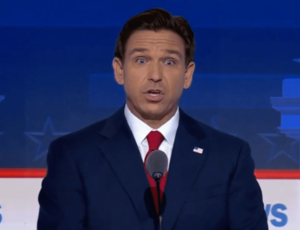Facts and history seems to be short in the Florida Governor’s campaign against marijuana
For those who love exploring and have visited Hershey, Pennsylvania, you know it has a unique smell. Built to produce the famous candy bar, the area smells like chocolate. It is a factory town pumping out the order all day long. Few places in the country has issues with smells like Hersey. But if you listen to Florida Governor Ron DeSantis, you would think over half the country has to deal certain odors.
DeSantis has called recreational cannabis a problem and lamented marijuana’s “stench”. This is in response to the state’s Supreme Court allowing recreational marijuana be put on the November ballot. It seems something’s smelly about DeSantis weed statement. He seems to not understand science or history. And with over 50% of the country population having access to legal marijuana, you think there might have been a bigger stink if his statement was correct.
RELATED: Looks Like Virginia Is The Newest Marijuana Nanny State
Now those over 40 can remember when it was legal to smoke inside, meaning in restaurants, groceries stores and other public spaces. You did get a whiff of stale tobacco. But smoking outside is now required by law. And while Florida is not in top 10 states which smoke, an estimated 2.2+ million of its citizens (not counting tourists) still light up. Yet, he has not made a comment of being near a beach or roaming the street of the state capital and smelling a Marlboro.

Near Tallahassee, where the Governor sits, he is near the Florida Panhandle. For generations, its economy was driven by paper mills. Living in this panhandle puts you near some of hte most beautiful beaches, but will also, in some areas, assult your sense of smell. RockTenn, one of the areas larger paper mills, produces some particularly odorous fragrances when they “cook” paper. A strong sulfuric smell occasionally wafts across the region, and though harmless, it’s certainly unmistakeable. An economic lifeline paper mills are a part of the fabric of North Florida. When the Foley Cellulose Mill in Perry closes, economist at the university of Florida predict havoc. It will cost Florida nearly 2,000 jobs and $9.9 million in state and local taxes. This is much less than the almost zero smell of gummies and vapes which will be part of the $1+ billion plus industry in the Sunshine State alone.
There are now 24 states (plus the District of Columbia) with legalized recreational marijuana as of February 2024. Some including California, New York and DC have high visitor counts, and yet no one complains of a long or even mid term cannabis odor over the city. Yes, like cigarettes, when you walk by someone smoking you can smell it, but as you pass, it goes away.
RELATED: Science Says Medical Marijuana Improves Quality Of Life
The Governor seems dismayed the Florida State Supreme Court advanced a proposed adult-use cannabis legalization initiative, by a 5-2 ruling, to the November 5, 2024, ballot. Florida voters again will be able to express their opinion.


 Cannabis News1 year ago
Cannabis News1 year ago
 One-Hit Wonders1 year ago
One-Hit Wonders1 year ago
 Cannabis 1011 year ago
Cannabis 1011 year ago
 drug testing7 months ago
drug testing7 months ago
 Marijuana Business Daily1 year ago
Marijuana Business Daily1 year ago
 Education1 year ago
Education1 year ago
 Cannabis1 year ago
Cannabis1 year ago
 Education1 year ago
Education1 year ago



























